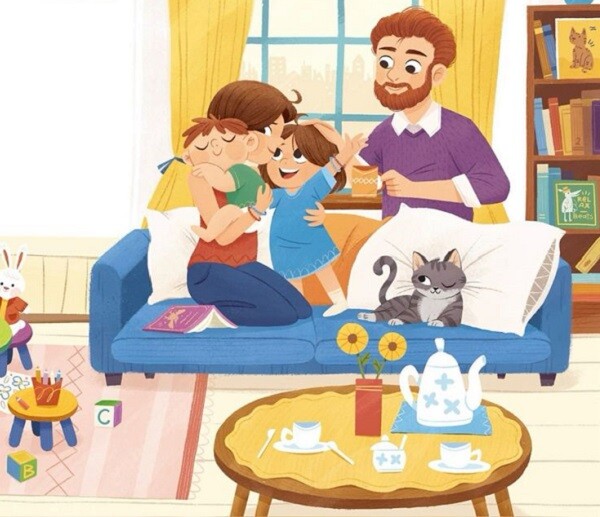A loving, supportive, and communicative family environment, for instance, lays a solid foundation for a child’s development. Conversely, a lack of care, conflict, or violence in the home can lead to unhealthy psychological growth.
Children raised in positive family settings tend to be more confident, have better communication skills, and build strong social relationships. Thus, to help children grow up successfully and live the life they desire, a positive family environment should encompass four essential factors.


Feeling safe with parents is the biggest “nutrition” for children’s development
Each child is an independent individual, much like a solitary tree. If all trees grew identically, the world would lose its splendor. Family education is both challenging and rewarding.
According to an expert, parental calmness is the most fantastic nourishment for a child’s development.
When parents educate their children based on fluctuating moods, the children are more likely to become helpless and unsure of their true desires, constantly anxious to please their parents’ temperaments.
However, if parents can regulate their emotions and communicate rationally with their children, the kids will undoubtedly develop a calm and peaceful mindset. Children raised in such an atmosphere will be able to face challenges and failures with composure.

Children who enjoy reading will be better equipped to overcome future failures
When it comes to family education, several factors come into play. The first is the environment in which children grow up.
A specialist shared that he often asks a question during his lectures on family education: “How many families have a bookshelf at home?”
The second question is: “How many of those bookshelves contain 500 books?” The third question is: “How many parents make it a habit to read to their children for 30 minutes to an hour before bedtime at night?”
Through numerous family surveys, he found that children who enjoy reading are more resilient and better equipped to overcome future failures. They internalize the knowledge gained from books and make it their own.

When asked about the difference between reading stories and watching movies, research indicates that being read to or reading independently enhances imagination and visual thinking far more effectively than merely watching cartoons.
This process is influenced by two factors. Firstly, fostering a reading habit in children encourages a lifelong love of reading. Secondly, it develops specific abilities that are crucial for life.
The seeds parents sow will take root and flourish in their children. Knowing the environment in which a child grows up is essential to understanding the person they will become.

The time parents spend with their children determines their perception of family
In reality, children are shaped by the combined influence of both parents, and mothers cannot accomplish this task alone.
When parents are with their children, they are consciously or unconsciously imparting their values through their behavior, which the children tend to emulate.
It is challenging to find a child with a broad-minded outlook in a narrow-minded family, just as it is rare to find a polite and innocent child in a coarse family.

Many parents emphasize the concept of “quality time” with their children. But what does quality time truly mean? When spending time with children, the most important aspect is educating them about moods and temperaments, shaping their character, fostering a cheerful and positive attitude, encouraging open-mindedness, and instilling resilience.
So, how can we ensure that children grow up with this type of education? When a child’s character, personality, attitude, spirit, habits, psychology, and social skills are well-developed, the path to future success is paved.
While the primary goal of a college education is to secure a good job, finding employment is not the be-all and end-all of life. Therefore, when children possess life skills they can rely on, they can become well-rounded individuals with sound cognition, rationality, and values.

Integrity, honesty, responsibility, friendliness, and kindness are key words to keep in mind when educating your children
Integrity, honesty, responsibility, friendliness, and kindness are the core values that experts recommend parents instill in their children.
A child’s development requires consistent and proper efforts from parents. While all parents love their children, inappropriate expressions of love and incorrect education can impact a child for life. Therefore, imparting positive attitudes and kindness is essential to steering children towards a brighter, more successful, and happier future.








































